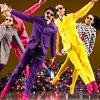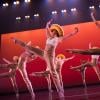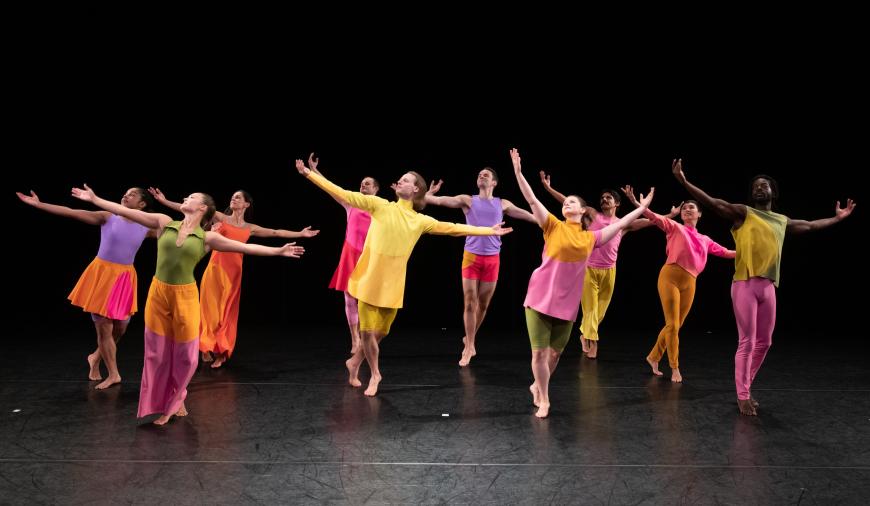
The iconic choreographer Mark Morris, whom The New Yorker described as “undeviating in his devotion to music,” never fails to surprise. Indeed, after making dances set to such composers as Handel, Monteverdi, Mozart, and Schumann, the New York-based artist created a global hit with his 2017 full-evening Pepperland, a groundbreaking terpsichorean tribute to the 50th anniversary of the Beatles’ album Sgt. Pepper’s Lonely Hearts Club Band.
And now? Cue the music of Burt Bacharach — with lyrics by Hal David — as Morris, who founded the Mark Morris Dance Group (MMDG) in 1980, unveils his latest opus, The Look of Love. The world premiere takes place at Santa Monica’s BroadStage Oct. 20–23. Co-commissioned by a national consortium of arts presenters, Love features some 14 songs by the multi-Grammy Award-winning pop composer and songwriter. The hour-long piece promises to be, in Morris’s own words, “an action-packed, music-drenched, dance-saturated evening for everybody.”
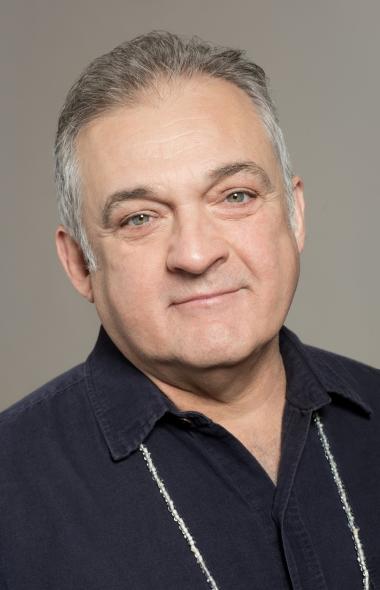
Coming from anyone else, this claim might sound somewhat, well, exaggerated. But not from Morris: A MacArthur Fellow who has fistfuls of honorary degrees in addition to numerous other awards, including the Samuel H. Scripps/American Dance Festival Award for lifetime achievement, the Seattle-born Morris, 66, has reason to guarantee a great night in the theater. Having directed numerous music festivals and operas, he’s collaborated with some of the world’s most elite performers, including cellist Yo-Yo Ma and pianist Emanuel Ax, and also has a deep commitment to live music, having formed the MMDG Music Ensemble in 1996.
For his latest endeavor, Morris, who opened the Mark Morris Dance Center in Brooklyn in 2001, is once again working with pianist/arranger Ethan Iverson. Having deployed his musical magic on Pepperland, Iverson has scored the new piece for piano, trumpet, bass, percussion, and lead vocals by singer, actress, and Broadway star Marcy Harriell. Love also features fanciful costumes bursting with geometric blocks of color by renowned fashion designer Isaac Mizrahi.
In a recent phone conversation, Morris’s sense of irony, mordant wit, and razor-sharp intelligence were on full display.
What was the genesis of The Look of Love? Had you been a Bacharach fan, and did this idea come out of the pandemic, or had you been thinking about it after the success of Pepperland?
Here’s the thing: I don’t want people to imagine that I’m doing the greatest hits from your parents in the ’60s and ’70s. It’s not like [Sue Grafton’s] A-to-Z crime novels. Ethan is doing the music with the full blessing of Mr. Bacharach himself. We always loved Bacharach, and a few years before Pepperland, we talked about doing it.
Ethan maintains he’s the Schubert of our day, and he’s lived three times as long! But if you’re old, you know the songs — [“Raindrops Keep Fallin’ on My Head” from] Butch Cassidy [and the Sundance Kid], the theme from Casino Royale — and if you’re young you know some of the songs — ish. But there’s so much that people don’t know. He’s been writing forever.
With extra young people — I don’t know where the cutoff is — but it’s like folk music. People don’t know anybody wrote it. Like “Happy Birthday” and the “Battle Hymn of the Republic,” everybody thinks those songs just exist.
While we don’t necessarily think in terms of rhythms and tempos with Bacharach, you and Ethan mined those elements in his body of work.
With Hal David’s lyrics, they’re just wonderful songs. I love Baroque and country music, but they’re not the biggest range in terms of tempo. Bach is chromatic and hard to sing. It’s the idea of public domain, that Bacharach’s songs are a part of American music, which they deeply are. So I thought, “Why not?” They’re upbeat but sad and are always about somebody leaving somebody, like all music is. It’s bright, lively, kind of sad.
Bacharach is 94. Had he been a fan of your work, and what kinds of discussions did you have with him?
I don’t know if he was a fan. He could have Googled me. But he was brief, and he’s excited about it. It was a little complicated, getting the rights and permissions, which we did. We had a Zoom meeting a year or so ago, and we were nervous. It was me and Ethan, [MDDG president and executive director] Nancy Umanoff, and my booking agent. We had a mosaic of Zooms with lawyers, managers, people who take care of his vast music empire.
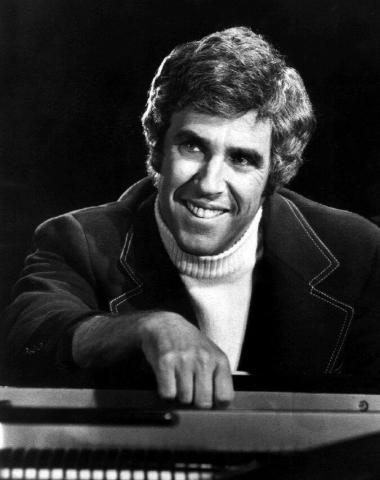
But he showed up and immediately made us comfortable. Ethan said, “Mr. Bacharach, I’m so happy to meet you.” He said, “Call me Burt.” He did a little bit of singing and said, “Have you thought about a medley?” which really opened it up for us. I was afraid he would be super strict. But we’re following a score, [which is like] a biggish jazz band, and it’s very straightforward. It’s not a wild sort of fantasia that we did with Pepperland because we needed it to be more like a bossa nova and beautiful.
How did you and Ethan narrow down Mr. B’s songbook, which in your rendering includes “(There’s) Always Something There to Remind Me,” “Walk On By,” “Don’t Make Me Over,” and other classics from his canon?
Ethan had some favorites, I did, too, and we agreed and disagreed and came up with this balance. One is “Message to Michael,” which is a favorite of my sister’s. It’s not super popular, but it is very beautiful. A lot of that was deciding the sequence, what keys, whether it should be slow or fast. It’s not just a playlist; it’s all connected. It’s a through-composed composition with a lot of variety.
These are wonderful compositions on their own, and we’re trying to make a show out of it. Burt himself sang a lot of songs, [as did] Aretha [Franklin] and Cilla Black. And I absolutely listened to an awful lot of Dionne Warwick.
Dare I ask if there’s a plot?
Every song has its own plot, which is usually about somebody leaving somebody. It’s not a variety show. There is no thematic link except us and the music and the viewer. It’s not, as Burt and I warned each other, a jukebox musical where you put in a nickel (but more like $5 today). And it’s not a karaoke night.
It seems that only you would make use of Bacharach’s theme song from the horror film The Blob, which was released in 1958.
The Blob — no one remembers that. But if you watch the movie, it’s incredible, it’s amazing, it’s fabulous. It’s firmly a B movie in the teenage horror genre. I’m not doing the movie, but it’s a scary theme song, and we’ve made it scarier and slowed it down.
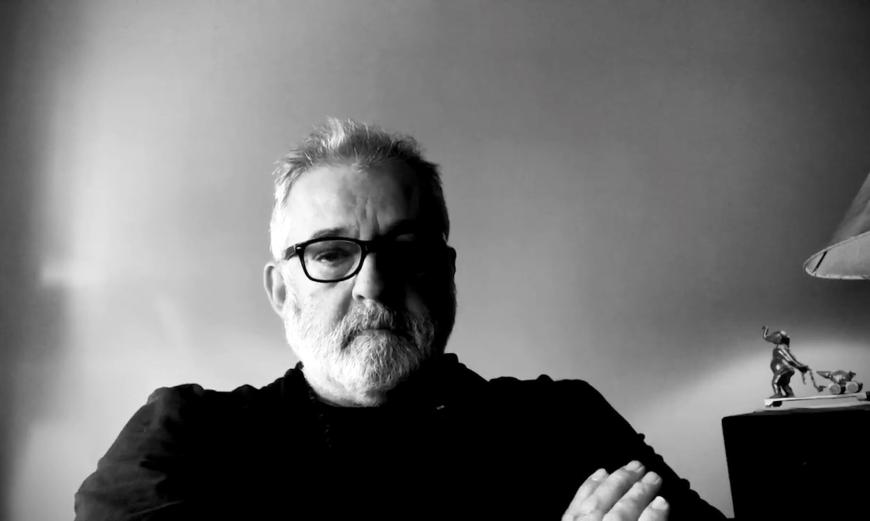
How did you decide to bring Marcy Harriell into the project?
It’s interesting. She seemed kind of familiar, and Ethan’s been working with her on tour. It turns out she was in a number of workshops for the wonderful yet failed Broadway musical The Capeman [based on the life of convicted murderer Salvador Agrón, with music by Paul Simon and choreographed by Morris]. The show was great, by the way. It just didn’t follow through. It was annulled [after 68 performances]. That’s not to say houses weren’t packed with a mostly Hispanic audience. It was wonderful, beautiful, and it didn’t work.
When Marcy showed up, she said, “I know you.” She’s a wonderful singer and actor, and she makes her own clothes. She’s just great. We also have a male and female backup singer.
You said that Bacharach’s music is a way of understanding how we get along with each other. How so?
I say a lot of things. I think basically most people feel mostly the same way about an awful lot of things. With country and western music, it’s about Bible, dog, truck, heartbreak. There aren’t a lot of dogs or trucks in this, but there is a lot of heartbreak. It’s not just “Boohoo, nobody understands me,” but there’s a bit of that in there.
Bacharach also has real bona fides for classical music. He studied with [Darius] Milhaud and, I believe, with Nadia Boulanger. [As for] the pop crowd, he covers a lot of harmonic and rhythmic territory. There aren’t direct quotes, but they’re inspired — no that’s a terrible word. The songs are based on many rhythms and pop styles that show when you play them all end to end.
It looks like you have a crop of new dancers as a result of the pandemic. How many are in the piece, and what do you look for in a dancer?
It helps if they can dance. That’s the first part. I look for adults who can hear music in a way that goes along with the way I do. You don’t have to like everything, but hear it and manifest it. The hard part for everybody was missing basically two years during COVID. The hardest hit were the people at the beginnings of their careers and those at the end. Both have happened.
I lost some dancers [because] it was time for them to go, and they have. My company, at its biggest, was 20, and now we’re down to 17. This dance is for 10. We have covers, and that’s obviously going to keep happening. COVID was hard on everybody at the extreme end of the spectrum, [where] one’s sort of fragile (including me), but everybody’s had a real tough time. You have to book this stuff in advance, and we missed a whole season.
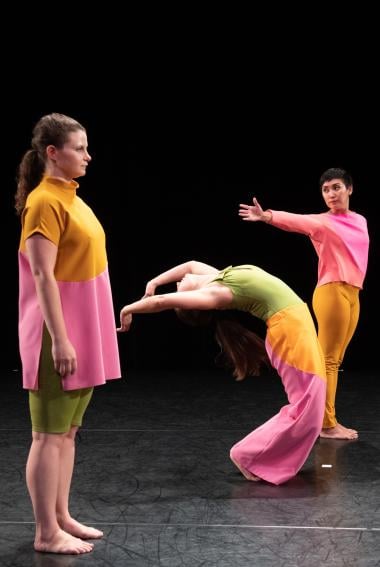
Now, we’ve done some shows and are gladly back to it. We’ll go to three places before New York with this [piece] — Alabama, and we have a longer run at The Kennedy Center. That’ll get us up to speed, and we have a lot of gigs lined up in the spring.
Having made some 150 dances for your company, do you ever get nervous before a premiere, and what do you do to relax?
Let’s use the term anxious — the answer is yes. I’m confident, and like everybody in show business, I have my doubts. If you didn’t want people to watch it, you wouldn’t do it in front of them. That’s for every actor, singer, dancer I know. The kind of excitement is based on, “Is it going to work? How am I doing?” It’s not stage fright but trepidation a little bit. I’m not trying to put out my third best piece. I’m trying to do a real good one, and I try not to do the same exact thing twice. If that sounds like low standards, it’s not. I want it to look and sound great and be interesting.
How do I relax? Sleep. I love sleeping. It’s one of my favorite things to do — but not just to avoid everything. I’ve been getting out more and back to cooking. I had skipped that for a while. I live alone, and I work with a bunch of people, and whenever they’re not accessible — hello, COVID — that’s lonelier. That’s rough, but it’s getting better.
Do you have any words of advice for aspiring choreographers?
Yes: Make up the dance. And if you can use live music, just do it. It’s worth it. There’s always an underappreciated pianist around that would be perfect for your show. And I’m not interested in your autobiography as a dance show.


